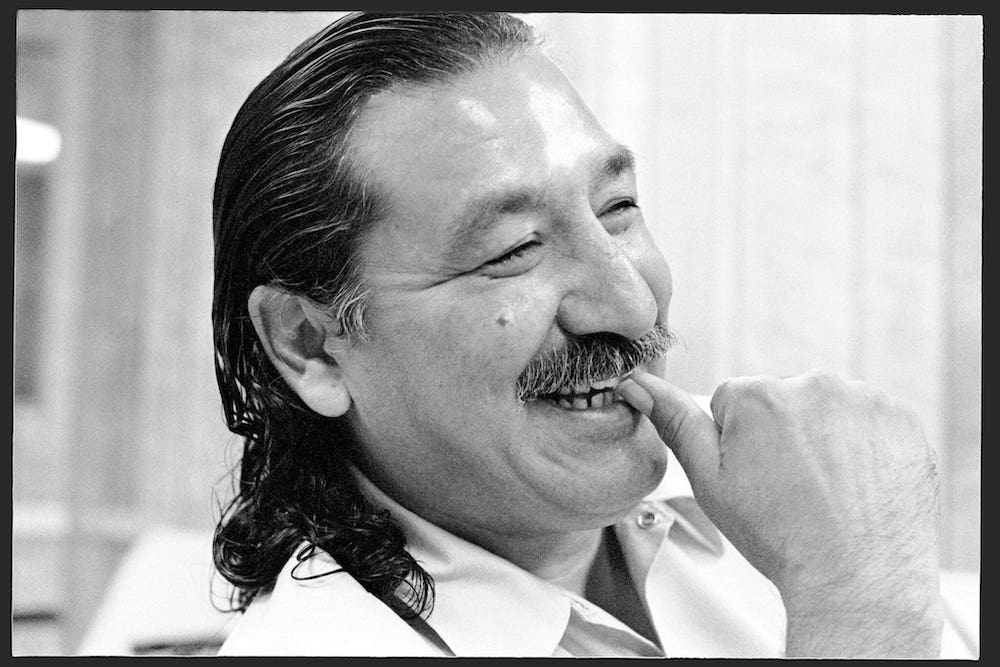
- Details
- By Levi Rickert
Incarcerated for almost 49 of his 80 years on Mother Earth, he was granted a presidential commutation by President Joe Biden. It was not the pardon that many of Peltier’s supporters wanted, but nonetheless, his release from prison into house confinement is a welcome end to a horrific chapter.
Peltier’s chapter of lengthy incarceration unfolded on June 26, 1975, at Jumping Bull Ranch in Oglala, South Dakota, on the Pine Ridge Indian Reservation.
It remains one of the most controversial and disputed incidents in modern Native American history. The deadly confrontation between the Federal Bureau of Investigation (FBI) and members of the American Indian Movement (AIM) resulted in the deaths of two FBI agents and one Native American activist. What followed was a series of judicial proceedings marred by misconduct, leading to the conviction of Leonard Peltier, a member of AIM, in what has widely been considered an unfair trial.
 Leonard Peltier at the Leesburg Airport to a catch flight home to Turtle Mountain Indian Reservation. (Photo/Ray St. Clari)
Leonard Peltier at the Leesburg Airport to a catch flight home to Turtle Mountain Indian Reservation. (Photo/Ray St. Clari)
Background: The Struggles of the American Indian Movement
The American Indian Movement was founded in 1968 as a grassroots organization dedicated to addressing issues of systemic discrimination, police brutality, and treaty violations against Native American communities. By the early 1970s, AIM had become a prominent force, challenging federal and local authorities over indigenous rights and sovereignty.
Pine Ridge Reservation in South Dakota was a particularly volatile region at the time, rife with political and social tension. The tribal chairman, Richard Wilson, was accused of corruption and brutality, and his private militia, known as the “GOON Squad” (Guardians of the Oglala Nation), terrorized AIM supporters and traditionalists who opposed his administration. Between 1973 and 1976, an estimated 60 AIM activists and their allies were murdered, often under suspicious circumstances. Many of these cases were never investigated by federal authorities.
Against this backdrop, AIM members and their supporters sought refuge at the Jumping Bull Ranch near Oglala, where they hoped to provide protection for local residents and maintain a presence to counter GOON Squad violence. Tensions with law enforcement escalated, culminating in the deadly shootout.
The Shootout: A Mysterious and Deadly Confrontation
On June 26, 1975, FBI agents Jack Coler and Ronald Williams entered the Jumping Bull Ranch reportedly to arrest a young AIM member on theft charges. However, an intense shootout ensued, with gunfire exchanged between AIM members and the FBI. The two agents were wounded and later executed at close range. Additionally, an AIM supporter, Joe Stuntz, was killed in the crossfire, though his death was largely ignored by authorities.
The circumstances surrounding the shootout remain murky. The FBI maintained that their agents were ambushed, while AIM members contended that they acted in self-defense, believing they were under attack from GOON Squad forces. The FBI’s response was swift and severe, launching one of the largest manhunts in U.S. history.
The Trial and Conviction of Leonard Peltier
Three AIM members—Dino Butler, Bob Robideau, and Leonard Peltier—were charged with the murders of the FBI agents. Butler and Robideau were tried separately in 1976 and acquitted on the grounds of self-defense, with the jury acknowledging the hostile climate on Pine Ridge Reservation. However, Peltier was extradited from Canada in 1976 under dubious circumstances, including an affidavit from an alleged eyewitness named Myrtle Poor Bear, who later recanted her testimony, claiming she was coerced by the FBI.
Peltier’s 1977 trial was held in Fargo, North Dakota, under a judge known for his hostility toward AIM. Unlike the Butler and Robideau case, Peltier was not allowed to argue self-defense and crucial pieces of evidence were manipulated or withheld. The prosecution relied heavily on ballistics tests that were later revealed to be inconclusive, and they falsely suggested that Peltier’s weapon was the one used in the killings. Additionally, witnesses were intimidated into testifying against him, further casting doubt on the legitimacy of the proceedings.
Despite the lack of concrete evidence linking Peltier to the close-range executions of the agents, he was convicted of two counts of first-degree murder and sentenced to two consecutive life terms in prison.
Controversy and Calls for Clemency
Since his conviction, Leonard Peltier’s case has drawn widespread criticism from legal experts, human rights organizations, and political figures. Amnesty International classified him as a political prisoner, citing grave concerns over the fairness of his trial. Former FBI agents, U.S. Congress members, and even Nelson Mandela have called for a review of his case.
Documents later obtained through the Freedom of Information Act revealed that the FBI had suppressed evidence that could have exonerated Peltier. The key ballistics evidence used to convict him was found to be unreliable, and the government eventually admitted that it could not determine who fired the fatal shots.
Over the decades, multiple appeals and requests for clemency have been denied, often under political pressure from the FBI, which has maintained a strong opposition to Peltier’s release. Even after serving nearly five decades in prison, he has been repeatedly denied parole.
Legacy and the Ongoing Fight for Justice
Leonard Peltier remains a symbol of Indigenous resistance and the deep flaws within the U.S. justice system. His case highlights the broader historical injustices faced by Native Americans and the U.S. government’s failure to address systemic issues within law enforcement and judicial processes.
Efforts to secure his freedom continue, with activists, attorneys, and international organizations advocating for a presidential pardon or a new trial. As long as Peltier remains imprisoned, the case serves as a stark reminder of the struggles for Indigenous rights and the ongoing fight for justice in America.
The shootout at Jumping Bull Ranch was not just an isolated incident but a manifestation of decades of oppression, broken treaties, and violent suppression of Native American activism. Whether or not Peltier is ever granted clemency, his story remains a powerful indictment of the American legal system and its treatment of Indigenous people. Until true justice is served, the fight for Leonard Peltier’s freedom remains an essential chapter in the broader movement for Native American rights and human rights worldwide.
As President Biden was nearing the end of his term, Native leaders advocating for Peltier’s freedom increasingly pressured Biden to grant Peltier clemency, with one tribal leader using his five minutes with the President on Air Force One to plead Peltier’s case.
As Biden was exiting office on his very last day, January 20, he signed an executive grant of clemency; while not a pardon, it commutated Peltier’s sentence so he shall serve the rest of his sentence back at home with his family, citing his severe health concerns and advanced age among contributing factors.
Even this action was widely opposed by law enforcement, who insisted that Peltier should remain imprisoned. Regardless, Leonard Peltier will be home on Tuesday, beginning a new chapter of his life.
Neely Bardwell contributed to this article.
More Stories Like This
Native News Weekly (August 25, 2024): D.C. BriefsDeb Haaland Rolls Out Affordability Agenda in Albuquerque
Boys & Girls Clubs and BIE MOU Signing at National Days of Advocacy
National Congress of American Indians Mourns the Passing of Former Executive Director JoAnn K. Chase
Navajo Nation Mourns the Passing of Former Vice President Rex Lee Jim
Help us defend tribal sovereignty.
At Native News Online, our mission is rooted in telling the stories that strengthen sovereignty and uplift Indigenous voices — not just at year’s end, but every single day.
Because of your generosity last year, we were able to keep our reporters on the ground in tribal communities, at national gatherings and in the halls of Congress — covering the issues that matter most to Indian Country: sovereignty, culture, education, health and economic opportunity.
That support sustained us through a tough year in 2025. Now, as we look to the year ahead, we need your help right now to ensure warrior journalism remains strong — reporting that defends tribal sovereignty, amplifies Native truth, and holds power accountable.
 The stakes couldn't be higher. Your support keeps Native voices heard, Native stories told and Native sovereignty defended.
The stakes couldn't be higher. Your support keeps Native voices heard, Native stories told and Native sovereignty defended.
Stand with Warrior Journalism today.
Levi Rickert (Potawatomi), Editor & Publisher


